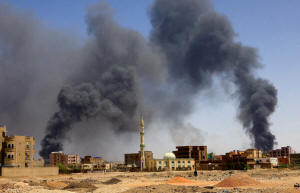Sudanese army suspends ceasefire talks, diplomatic source says
 Send a link to a friend
Send a link to a friend
 [May 31, 2023]
By Khalid Abdelaziz [May 31, 2023]
By Khalid Abdelaziz
JEDDAH, Saudi Arabia (Reuters) -Sudan's army suspended talks with a
rival paramilitary force on Wednesday over a ceasefire and aid access, a
Sudanese diplomatic source said, raising fears the six-week-old conflict
will push Africa's third largest nation deeper into a humanitarian
crisis.
The negotiations with the Rapid Support Forces (RSF), which began in
early May, had produced a declaration of commitments to protect
civilians and two short-term ceasefire deals, although those deals were
repeatedly violated.
Residents had reported heavy clashes in southern Khartoum and in
Omdurman across the River Nile until late on Tuesday.
The army, which relies on airpower and artillery, and the RSF, a more
lightly armed force but a tough adversary in Khartoum street battles,
had agreed to extend a week-long ceasefire deal by five days just before
its Monday expiry.
Army chief Abdel Fattah al-Burhan, a career military officer, and RSF
General Mohamed Hamdan Dagalo, a former militia commander known as
Hemedti, have been locked in a battle for power since April 15. Neither
side seems to have an edge.

"We do not want to use lethal force. We still haven't used our maximum
strength ... We don't want to destroy the country," Burhan said in a
military video released on Tuesday, speaking to cheering forces at a
military base with a gun slung on his back
"But if the enemy does not obey and does not respond we will be forced
to use the strongest force we have," he said.
The RSF said in a statement late on Tuesday it was committed to the
ceasefire "despite repeated violations" by the army.
Sudan has a history of political upheaval, coups and conflicts, but
violence has usually hit regions far from Khartoum. This time, fighting
has centred on the capital, an urban sprawl at the confluence of the
Blue and White Nile rivers and home to millions of people.
Commenting on the Sudanese army's withdrawal from the Jeddah talks,
Mohamed El Hacen Lebatt, African Union spokesperson on the crisis in
Sudan, said: "It is not surprising. It happens often. We hope the
mediator will succeed to bring both parties for working on expected
ceasefire."
The capital has seen widespread looting and frequent power and water
supply cuts. Most hospitals have stopped functioning.

[to top of second column]
|

A man walks while smoke rises above
buildings after aerial bombardment, during clashes between the
paramilitary Rapid Support Forces and the army in Khartoum North,
Sudan, May 1, 2023. REUTERS/Mohamed Nureldin Abdallah

TRUCE VIOLATIONS
Before the ceasefire deal was renewed, an army source said the army
had demanded the RSF withdraw from civilian homes and hospitals as a
condition for an extension. After the five-day extension was agreed,
talks continued on the truce terms.
The truce has been brokered and is being remotely monitored by Saudi
Arabia and the United States. They say it has been violated by both
sides, although the truce has still allowed the delivery of aid to
an estimated 2 million people.
The war has killed hundreds of people, displaced more than 1.2
million inside Sudan and driven 400,000 others across borders to
neighbouring states, the United Nations says.
Clashes have also erupted outside the capital, including Darfur, a
region in the far west of Sudan where a conflict that erupted in
2003 has flared on and off for years.
The United Nations, some aid agencies, embassies and parts of
Sudan's central government have moved operations out of the capital
to Port Sudan on the Red Sea, which has stayed calm.
Leaders of the army and RSF, which emerged from militias the
government used to quell an earlier uprising in Darfur, held top
positions on Sudan's ruling council after former President Omar al-Bashir,
also an army commander, was toppled in 2019.
After Bashir was ousted in a popular uprising, the army with RSF
leaders staged a coup in 2021 before they were due to hand
leadership to civilians.

Army chief Burhan and RSF leader Hemedti fell out over the chain of
command and restructuring of the RSF under the planned transition to
civilian rule. After conflict flared, Burhan sacked Hemedti as his
deputy in the ruling council.
(Additional reporting by Dawit Endeshaw in Addis Ababa; Writing by
Michael Georgy; Editing by Andrew Heavens and Edmund Blair)
[© 2023 Thomson Reuters. All rights
reserved.]This material may not be published,
broadcast, rewritten or redistributed.
Thompson Reuters is solely responsible for this content. |